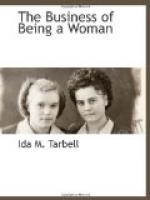her development. Housekeeping is only the shell
of a Woman’s Business. Women lose themselves
in it as men lose themselves in shopkeeping, farming,
editing. Knowing nothing but your work is one
of the commonest human mistakes. Pitifully enough
it is often a deliberate mistake—the only
way or the easiest way one finds to quiet an unsatisfied
heart. The undue place given good housekeeping
in many a woman’s scheme of life is the more
tragic because it is a distortion of one of the finest
things in the human experience—the satisfaction
of doing a thing well. It is a satisfaction which
the worker must have if he is to get joy from his
labor. But labor is not for the sake of itself.
It must have its human reason. You rejoice in
a “deep-driven plow”—but if
there was to be no harvest, your straight, full furrows
would be little comfort. You rejoice to build
a stanch and beautiful house, but if you knew it was
to stand forever vacant, joy would go from your task.
An end work must have. One does not keep house
for its own sake. It is absorption in the process—the
refusal to allow it to be forgotten or utilized freely,
that makes the work barren. It is like becoming
so absorbed in a beautiful frame that you are unconscious
of the picture—unconscious that there is
a picture. Things must serve their purpose if
they are to convince of their beauty. Try living
in a room with a wonderfully fitted fireplace; its
mantel of exquisite design and workmanship, its fire
irons masterpieces of art—and no heat from
it! Note how utterly distasteful it all becomes.
It is no longer beautiful because it does not do the
work it was made beautiful to do.
One of the most repellent houses in which I have ever
visited was one in which there was, from garret to
cellar, so far as I discovered, not one article which
was not of the period imitated, not one streak of
color which was not “right.” It was
a masterpiece of correct furnishing, but it gave one
a curious sense of limitation. One could not
escape the scheme. The inelasticity of it hampered
sociability—and there grew on one, too,
a sense of unfitness. His clothes were an anachronism!
They were the only thing which did not belong!
There is an old-fashioned adjective which describes
better than any other this preoccupation with things,
which so often prevents a woman’s coming to
an understanding of the heart of her Business.
It is old maidish. It has often been the
pathetic fate of single women to live alone.
To minister to themselves becomes their occupation.
The force of their natures turns to their belongings.
If in straitened circumstances they give their souls
to spotless floors; if rich, to flawless mahogany
and china, to perfect household machinery. Wherever
you find in woman this perversion—old maidish
is perhaps the most accurate word for her—it
is a sacrifice of the human to the material.
A house without sweet human litter, without the trace
of many varying tastes and occupations, without the
trail of friends who perhaps have no sense of beauty
but who love to give, without the scars of use, and
the dust of running feet—what is it but
a meatless shell!




